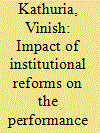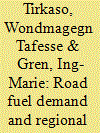| Srl | Item |
| 1 |
ID:
123165


|
|
|
|
|
| Publication |
2013.
|
| Summary/Abstract |
This paper examines the impact of military spending on general government debt in the enlarged European Union (EU) countries. For this purpose, we use panel data analysis and provide estimates from a dynamic Generalized Method of Moments (GMM) panel model. The dynamics are found to be important and the results suggest that military expenditures do have a large positive impact on the share of general government debt in the EU.
|
|
|
|
|
|
|
|
|
|
|
|
|
|
|
|
| 2 |
ID:
181438


|
|
|
|
|
| Summary/Abstract |
The Indian power sector has seen significant institutional changes in the last two decades. After more than 20 years of reforms, the distribution segment is still incurring losses. To quantify these institutional changes, we construct a reform index and then employ data of 55 power utilities from 29 Indian states for 2007–08 to 2015–16 to see the impact of this index on their financial and technical-cum-commercial performance. This paper contributes to the literature in three ways: a) accounting for the maturity of the reforms while calculating the index, b) relying on the dynamic nature of the reforms, and c) carrying out the analysis at the utility level. We find that once the dynamic nature of the data is accounted for and utility-specific variables are controlled, the reform index influences both the financial and the technical-cum-commercial performance of the utilities. An important policy implication of the present study is that as long as the cost-reflective tariff is still prevalent, the commercial viability of utilities cannot be assured
|
|
|
|
|
|
|
|
|
|
|
|
|
|
|
|
| 3 |
ID:
176833


|
|
|
|
|
| Summary/Abstract |
This study estimated national and regional-level gasoline and diesel demand elasticities in Sweden using county-level panel data from 2001 to 2018. The estimated elasticities were used to calculate county cost effect of the Swedish CO2 emission reduction policy in the transport sector. The national-level elasticities were estimated by employing general method of moments (GMM) estimators, while county-level elasticities were calculated by considering the weight of each fuel type share at county and national levels. Own prices, per capita income, and per capita vehicle stocks were statistically significant at national level in determining gasoline and diesel demand. The calculated regional price elasticities showed variation between counties, with the highest being almost 4 times higher than the lowest in absolute terms. A simulation of fuel taxes to achieve the Swedish 2030 emission target for the transport sector under the national and regional price elasticities indicated minor differences at the national level with respect to CO2 taxes, costs and regressivity in the taxes. The results showed considerable differences at the regional level where costs and carbon tax payments can be considerably higher for some counties with the use of national price elasticities and the opposite is the case for other counties.
|
|
|
|
|
|
|
|
|
|
|
|
|
|
|
|